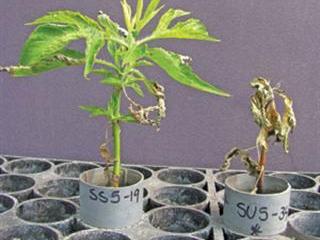
Glyphosate, the active ingredient in the weedkiller RoundUp, is the most widely used herbicide in the US. Over the years, however, certain plants have become resistant to it. Researchers at Purdue University, Indiana, now believe that the reason for this lies in soil microbes.
Most laboratory tests on glyphosate resistance are conducted in sterile soil, void of microbes. “The soil is important to the results,” explains graduate student Jessica Schafer. “If we use a sterile medium, we could get false positive results, because the plants are more tolerant to glyphosate under those conditions.”
The research team grew giant ragweed, horseweed and common lambsquarter in both sterile and field soil, and treated them with glyphosate. In each soil, strains of weeds that were both susceptible and resistant to glyphosate were tested. The scientists found that both strains of giant ragweed were damaged by the glyphosate to a greater extent in the field soil than in the sterile soil. The susceptible strain of common lambsquarter was more heavily damaged in the field soil. With horseweed, both strains were damaged to the same extent in both soils.
Overall, the results show that microbes play an important role in the activity of glyphosate, presumably by invading the glyphosate-weakened plants. The results also suggest that glyphosate-resistant weeds may be more resistant to disease pressure. “Soil microbes can be contributors to how glyphosate is able to affect plants,” says Associate Professor Steve Hallett. “We may be selecting not only for glyphosate resistance, but inadvertently selecting for weeds with disease resistance as well.”
The researchers next intend studying how fungi in the soil affect root development, both with and without glyphosate.













